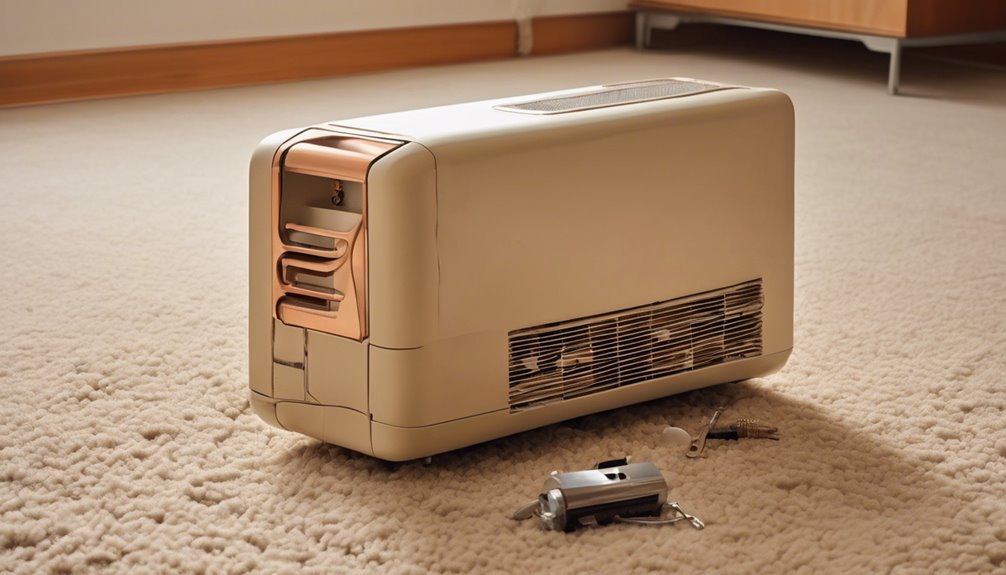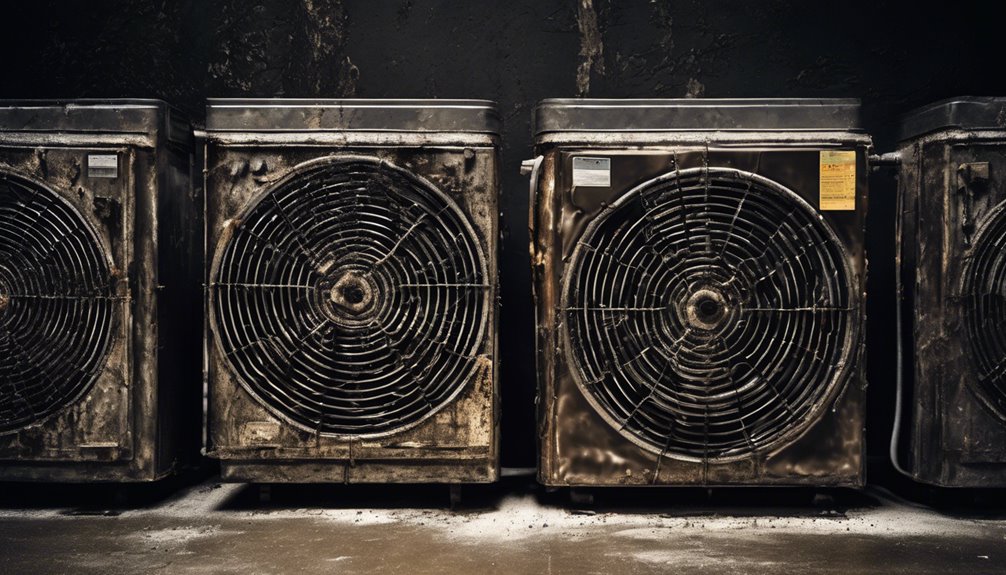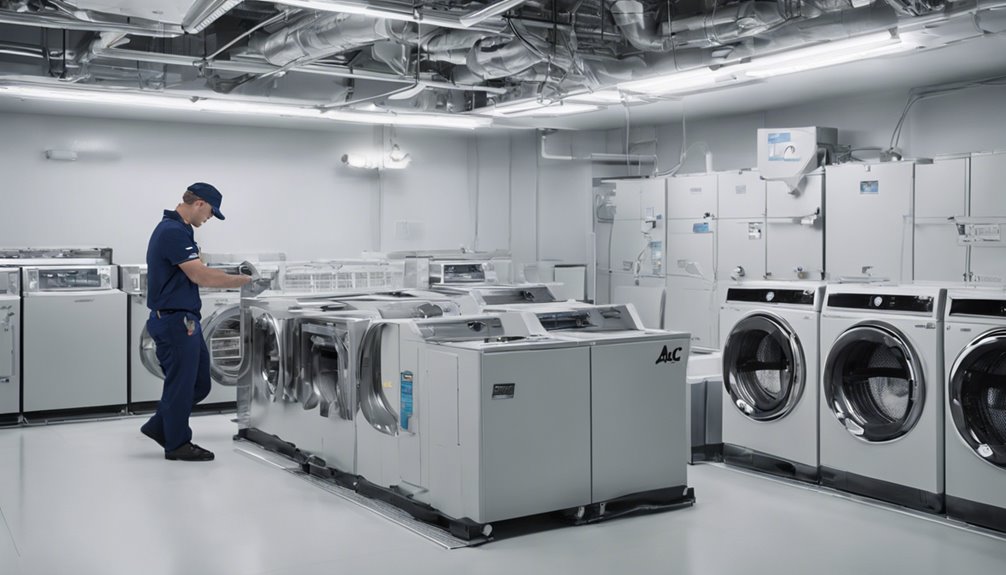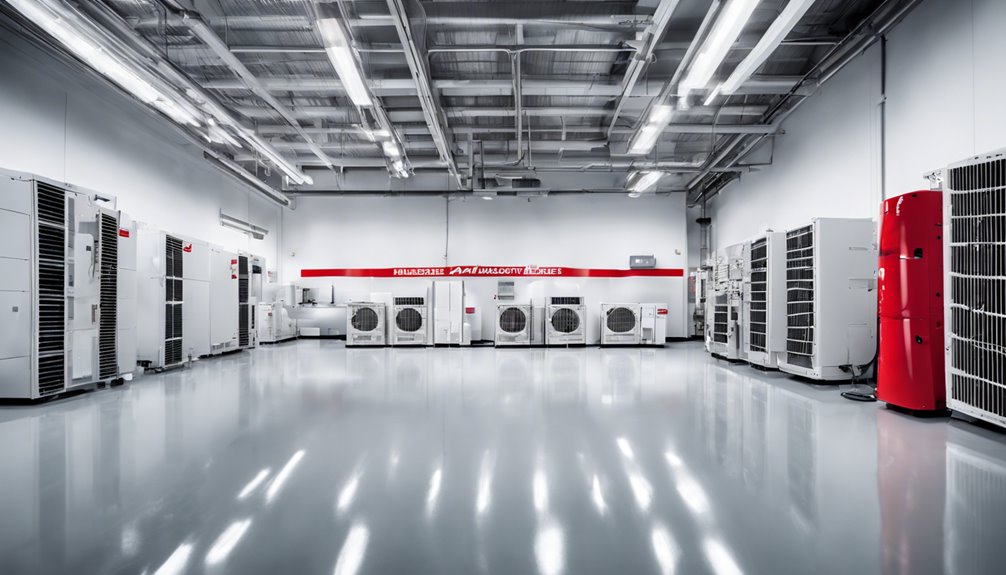If your air conditioner is making a loud noise, it's likely because of a worn or loose belt, a faulty compressor, refrigerant leaks, or electrical issues. These problems can cause vibration, rattling, or grinding sounds, and ignoring them can lead to further damage and higher energy bills. Regular maintenance checks can help identify and fix these issues before they become major problems, so take a closer look at your AC's mechanics to pinpoint the source of the noise and get back to a quieter, more comfortable home.
Key Takeaways
- A worn or loose belt can cause loud noise in your air conditioner, and regular inspection can identify signs of wear or damage.
- A faulty compressor or iced-up coils can lead to loud rattling or grinding sounds, and prompt replacement or cleaning can resolve the issue.
- Dirty air filters can reduce airflow, causing loud noise and increased energy bills, and regular cleaning can prevent these issues.
- Refrigerant leaks or electrical issues like tripped circuits, overheated wires, or faulty capacitors can be hidden culprits behind AC noise.
- Ignoring loud noise can lead to further damage and increased energy bills, and regular maintenance can help identify and fix issues before they become major problems.
Worn or Loose Belts: A Common Cause of AC Noise
Worn or loose belts can be a significant contributor to the loud noise emanating from your air conditioner.
If you're wondering why your AC is making a racket, it's worth taking a closer look at the belts. Over time, they can wear down or become loose, causing the noise.
Regular belt inspection is crucial to identify any signs of wear or damage. You should check for cracks, frays, or excessive wear on the belts.
As part of your belt maintenance, make sure to tighten any loose belts and replace worn-out ones. By doing so, you can significantly reduce the noise level and ensure your AC runs smoothly and efficiently.
Refrigerant Leaks: The Silent Killer of AC Systems
Refrigerant leaks can be the silent culprit behind your AC's loud noise and decreased performance.
You mightn't notice it at first, but a refrigerant leak can cause your AC to work harder, leading to increased energy bills and a shorter system lifespan.
A refrigerant leak can silently sabotage your AC, driving up energy bills and shortening its lifespan.
It's essential to schedule regular refrigerant checks to identify potential leaks. A professional technician can perform leak detection using specialized equipment to pinpoint the source of the leak.
Don't wait until it's too late; address refrigerant leaks promptly to prevent further damage. Remember, ignoring the issue can lead to compressor failure, which can be an expensive repair.
Stay proactive, and your AC will thank you.
Clogged Air Filters: How Dirt and Debris Can Disrupt AC Operation
When you neglect to clean or replace your air filters, you're essentially inviting trouble into your AC system.
A dirty filter can lead to reduced airflow, causing your AC to work harder and louder, which may explain the annoying noise you're experiencing.
As a result, you'll not only face decreased system performance but also higher energy bills and a shorter system lifespan.
Dirty Filter Consequences
A dirty air filter can wreak havoc on your AC's performance, leading to a loud noise that's both annoying and alarming. When you neglect to clean or replace your air filter, dirt and debris accumulate, causing dirty consequences that affect your AC's operation.
| Dirty Filter Consequences | Effects on AC |
|---|---|
| Increased Air Pressure | Loud Noise, Increased Energy Bills |
| Reduced Cooling Capacity | Warmer Room Temperature, Longer Cooling Time |
| Motor Strain | Premature Wear and Tear, Breakdowns |
| Ice Build-up | Frozen Coils, Water Leaks |
Filter neglect can lead to a vicious cycle of dirty consequences, putting your AC under unnecessary stress. By keeping your air filter clean, you can prevent these issues and enjoy a quieter, more efficient AC operation.
Reduced Airflow Effects
Clogged air filters restrict airflow, causing your AC to work harder and make more noise.
As a result, you'll notice your AC's compressor and fan motor working overtime, generating excessive noise. This is because air restrictions reduce the unit's ability to breathe, forcing it to compensate by increasing its effort.
Ventilation obstacles like clogged filters create a ripple effect, impacting the entire system's performance. With reduced airflow, your AC's components will wear down faster, leading to premature failure.
It's essential to regularly clean or replace your air filters to ensure optimal airflow and minimize noise. By doing so, you'll enjoy a quieter, more efficient, and longer-lasting AC system.
Increased Energy Bills
Your energy bills will skyrocket if you neglect to clean or replace your air filters regularly.
A clogged air filter forces your AC to work harder, leading to high consumption and reduced energy efficiency. As a result, your unit will consume more power to cool your space, causing your energy bills to increase significantly.
This can put a strain on your wallet and the environment. By cleaning or replacing your air filters regularly, you can prevent this unnecessary increase in energy consumption and keep your energy bills in check.
Faulty Compressor: The Heart of the AC System
You're probably aware that your AC's compressor is the heart of the system, responsible for circulating refrigerant and keeping your home cool.
However, if the compressor motor fails or its bearings wear out, it can cause your AC to make loud noises.
These issues can quickly escalate into more serious problems, so it's essential to identify and address them promptly.
Compressor Motor Failure
As the heart of the AC system, the compressor motor plays a crucial role in circulating refrigerant and facilitating heat transfer.
However, like any mechanical component, it's prone to failure. Compressor motor failure can be a major contributor to your AC making loud noise.
Over time, motor wear can lead to increased friction, causing the motor to work harder and produce more noise. Additionally, motor overheating can also cause the motor to seize or fail, resulting in loud rattling or grinding sounds.
If you suspect compressor motor failure, it's essential to turn off your AC to prevent further damage and call a professional for assistance.
Worn Bearings Cause
Faulty compressor bearings can be another culprit behind your AC making loud noise.
When they wear out, they can cause the compressor to vibrate excessively, resulting in annoying sounds. If you suspect worn bearings are the issue, it's essential to act quickly to prevent further damage.
A thorough noise diagnosis is necessary to identify the source of the problem. If the diagnosis confirms worn bearings, replacement is the next step.
Don't delay; prompt bearing replacement can save you from costly repairs down the line. By addressing the issue early, you can restore your AC's quiet operation and enjoy a comfortable indoor environment once again.
Iced-Up Coils: When Frost and Ice Take Over
If you've noticed your AC making loud noise, it's possible that iced-up coils are the culprit.
When frost buildup and ice accumulation occur on your AC's coils, it can cause the compressor to work harder, resulting in loud rattling or grinding sounds.
Frost buildup and ice accumulation on AC coils can cause the compressor to work harder, resulting in loud rattling or grinding sounds.
Here are four reasons why iced-up coils might be the source of the noise:
- Dirty air filters: If your air filters are clogged, it can reduce airflow, causing the coils to freeze.
- Low refrigerant: Leaks or undercharging can lead to frost buildup on the coils.
- Poor drainage: If water isn't draining properly, it can accumulate and freeze on the coils.
- High humidity: High humidity can cause moisture to accumulate on the coils, leading to ice accumulation.
Check your AC's coils and address any issues to eliminate the noise.
Loose or Faulty Mounts: How Vibration Can Cause Noise
Your AC's loud noise could also be caused by loose or faulty mounts, which can allow the unit to vibrate excessively and produce rattling sounds.
When the mounting systems aren't secure, the AC's internal components can vibrate and create noise. This excessive vibration can also lead to premature wear and tear on the unit.
To fix the issue, you'll need to inspect and tighten the mounts. Consider upgrading to vibration-dampening mounts or adding vibration-absorbing materials to reduce the noise. By addressing the loose or faulty mounts, you can minimize the vibration and enjoy a quieter AC operation.
Electrical Issues: The Hidden Culprits Behind AC Noise
Electrical issues can be the hidden culprits behind your AC's loud noise, and they're often overlooked.
You mightn't think to check the electrical system when your AC starts making a racket, but it's worth investigating.
Don't overlook the electrical system when your AC starts making noise – it's a often-neglected culprit worth investigating.
Here are some potential electrical issues to look out for:
- Tripped circuits: If your AC's circuit has tripped, it can cause the unit to malfunction and produce noise.
- Overheated wires: Wires that are overheating can produce a burning smell and cause your AC to make strange noises.
- Faulty capacitors: A faulty capacitor can prevent your AC's compressor and fan motor from working properly, leading to noise.
- Loose connections: Loose connections between wires can cause sparks and electrical arcing, resulting in loud noises from your AC.
Frequently Asked Questions
Can I Fix a Noisy AC on My Own?
You can try DIY troubleshooting to identify and potentially fix the noisy AC issue on your own, but if the problem persists, consider consulting a pro for thorough AC maintenance to ensure a lasting solution.
Will a Noisy AC Increase My Electricity Bill?
You're wondering if a noisy appliance will hike your electricity bill. The answer is yes, it might. Unusual noise patterns often indicate increased energy consumption, which can lead to higher bills, so it's worth investigating the cause of the racket.
Can a Dirty AC Exterior Cause Noise?
You're wondering if a dirty AC exterior contributes to noise. Yes, it can! Debris accumulation on the exterior unit's coils and fan can cause vibration, leading to noise. Additionally, filter blockage from dirt and dust can further exacerbate the issue, making your AC noisy.
Does a Noisy AC Affect Air Quality?
When you notice a noisy AC, you wonder if it's affecting air quality. The answer is yes, as reduced air circulation and increased sound waves can stir up pollutants, reducing indoor air quality, which you breathe in.
Will a New AC Always Be Quieter Than an Old One?
When you invest in a new AC, you can expect a significant sound reduction, as modern units are designed to operate at a lower noise level than older models, providing a quieter and more comfortable living space.
Conclusion
You've identified the possible causes of your AC's loud noise, from worn belts to electrical issues. Now it's time to take action. Start by inspecting and cleaning your AC's filters and coils. Check for refrigerant leaks and loose mounts. If the problem persists, it may be worth calling a professional to diagnose and fix the issue. Remember, addressing the problem early can save you from costly repairs and ensure your AC runs smoothly and quietly.



